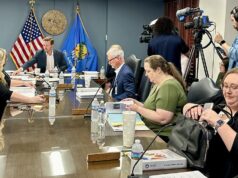
(Editor’s note: Today, NonDoc presents two examinations of Oklahoma’s education system following the defeat of State Question 779 by voters Nov. 8. On one hand, James Davenport writes about how Oklahoma needs a new system entirely. On the other, John Thompson writes below that education advocates have reason to be optimistic despite obstacles.)
Former state Speaker of the House Steve Lewis opened his Nov. 4 article for Oklahoma Policy Institute with the observation:
For a state with a well-deserved reputation for loathing government, we Oklahomans sure spend a lot of time, energy and money governing ourselves.
Weirdly, that’s the good news! After a two-decade campaign to shrink government to the size where it can be drowned in the bathtub, Oklahoma City voters (at least) are pushing back.
2016’s victories in governing ourselves
Not long ago, it looked like Oklahoma was bound to follow North Dakota with an overwhelming victory for the so-called Right to Farm amendment, but corporate agriculture’s SQ 777 was defeated.
Meanwhile, Oklahoma’s incarceration rate is No. 2 in the nation, and we are No. 1 in the world for imprisoning women, but the passage of SQs 780 and 781 make simple possession of drugs a misdemeanor and allocate the savings from reduced prison sentences to local communities for mental health and drug treatment.
And who anticipated such a victory against SQ 790, which was a stalking horse for displaying the Ten Commandments at the Capitol? An ecumenical coalition successfully defended the First Amendment!
Last, although it was a terribly disappointing election for teachers across the state, the OKC metropolitan area sent two Democratic educators, Mickey Dollens and Forest Bennett, to the Legislature. We also re-elected Rep. Cyndi Munson (D-OKC) and elected Colin Walke, both Dems.
SQ 779’s defeat illustrates divisions
On the other hand, the surprising defeat of SQ 779 illustrates some of the divisions that undermined Hillary Clinton. Echoing the (valid) complaints by Bernie Sanders’ supporters who had powerful and mixed feelings about Clinton, a significant number of my liberal friends voted against SQ 779. That’s not surprising since there was a strong case against its regressive sales tax increase.
But I’d like to take a point of personal privilege on a similar issue.
The Red Dirt Report articulated a misguided but understandable fear that educators must oppose SQ 779 because the pro-charter Stand for Children supported it. Yes, the national Stand organization and many of its state chapters engage in the despicable politics of destruction. They use charter expansion as a weapon to defeat school systems, unions and supporters of traditional public schools. But there are a few state Stand for Children chapters that have taken an honorable approach to school improvement, and that has been my experience with the Stand leaders in Oklahoma.
Regardless, our votes should be based on what’s best for students, not the positions of our adult opponents in terms of other issues.
Misinformation, suspicion held sway over 779
More regrettable were the anti-SQ 779 commercials that were worthy of a Donald Trump attack ad, falsely claiming that the majority of the money the measure would have brought in would not have gone to teachers.
Also, some had doubts about the portion of the money that would have gone to higher education, questioning the motive of OU President David Boren, who led the SQ 779 campaign. Boren, admittedly, was guilty of turning the University of Oklahoma into a world-class institution of higher learning.
Most frustrating of all, suspicion was raised about the 8 percent of new monies that would have gone to the Oklahoma State Department of Education. But that would have been the best part of passing 779! That money would have gone to the SDE to fund early childhood education.
And that brings us back to the biggest problem with SQ 779: It was a threat to cities’ sales-tax base. To move forward, school systems and city government must be partners, not opponents.
Changing demographics offer hope
Post-election, it may be hard or impossible to be hopeful for the state’s overall political progress. As the OKC metro grows more multicultural, however, we have more reasons for hope than despair.
Political scientist Keith Gaddie recently presented one of the best analyses to Oklahoma Watch and to the Kids Count annual conference of what it will take to turn around Oklahoma and our schools. Gaddie explained that 80 percent of the state’s voters are white, but half of Oklahomans younger than 25 are nonwhite. Moreover, the next U.S. Census will indicate a shift in power to urban areas where diversity is growing, meaning Oklahoma could become a swing state eventually.
Let’s come together and build on the defeat of SQ 777, the passage of SQs 780 and 781, the approval of the OKCPS bond issue, our new superintendent’s leadership and our new, dynamic, young state legislators.





















